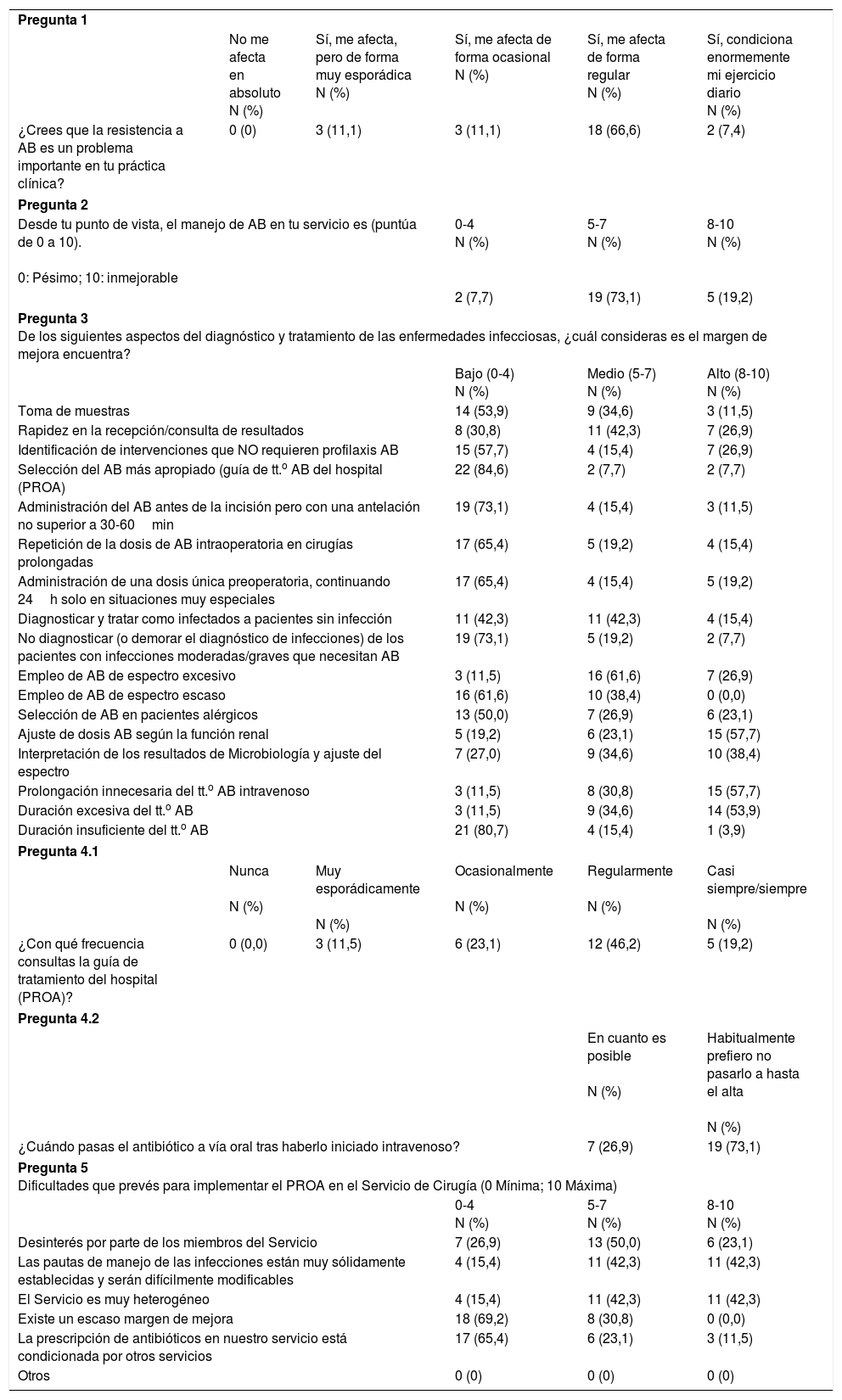La administración de antimicrobianos contribuye a la aparición de resistencias microbianas y al incremento de infecciones por gérmenes multirresistentes. La patología infecciosa, primaria o como complicación, es una de las más comunes en el ámbito de la cirugía general, y con frecuencia las infecciones se tratan excesivamente. Explorar la percepción de los cirujanos previamente a la implantación de programas de optimización del uso de antimicrobianos (PROA) resulta interesante para adaptar el programa al contexto local.
ObjetivoConocer la percepción de los cirujanos acerca del manejo de las infecciones y prescripción de antibióticos (AB) en un servicio de cirugía general (SCG).
MétodosEstudio descriptivo transversal mediante un cuestionario anónimo distribuido en formato papel abordando aspectos referentes al manejo AB.
ResultadosLa muestra fue de N=42 y la tasa de respuesta del 65%. El 75% consideraba que la resistencia a antimicrobianos representaba un problema. Las principales situaciones consideradas con medio/alto margen de mejora fueron: tiempo que transcurre desde la toma de la muestra hasta la recepción de los resultados (70%), empleo AB de espectro y duración excesivos (88 y 89%), duración excesiva del tratamiento AB (89%), mantenimiento vía intravenosa hasta el alta del paciente (73%). Las dificultades de la implementación del PROA fueron: pautas antibióticas establecidas y sólidas en el SCG (84%) y la heterogeneidad del SCG (84%).
ConclusionesLos aspectos organizativos del SCG constituyen uno de los problemas para implementar el PROA. Se ha constituido un equipo multidisciplinar específico donde se abordan distintos aspectos formativos, sirviendo de foro de discusión periódica de determinados pacientes complejos que presentan dificultades en el manejo AB.
The misuse and overuse of antimicrobials can contribute to an increase in antimicrobial resistance, increasing the risk of infections caused by drug-resistant bacteria. Most common surgical pathologies are infectious (either primary or as a complication), often being over-treated. Exploring the perception of surgeons on the use of implementing Antimicrobial stewardship programs (ASPs) is relevant in order to adapt the program to local context.
ObjectiveTo determine the perception of surgeons on the management of infections and antibiotic (AB) prescription in a General Surgery Department (GSD).
MethodsA cross-sectional and descriptive study was conducted using an anonymous questionnaire that was distributed to assess the aspects related to AB management.
ResultsA total of 42 questionnaires were completed, with a 65% response rate. The large majority (75%) considered that antimicrobial resistance was an important problem. The main situations considered with medium/high margin of improvement were: time from taking the specimen to receiving the results (70%), use of a wide spectrum AB, and excessive duration (88% and 89%), dose adjustment according to renal function (81%), unnecessary prolongation of intravenous AB treatment (87%) and excessive duration of it (89%), preference for intravenous AB administration until discharge of the patient (73%). There were also difficulties in ASP implementation, as well as established and solid AB patterns (84%) and the heterogeneity of the GSD (84%).
ConclusionsOrganisational aspects of the GSD constitute one of the problems to implement the ASPs. A specific multidisciplinary team has been constituted to address different training aspects. This will also serve as a forum of discussion of certain complex patients with difficulties in antibiotic management.







